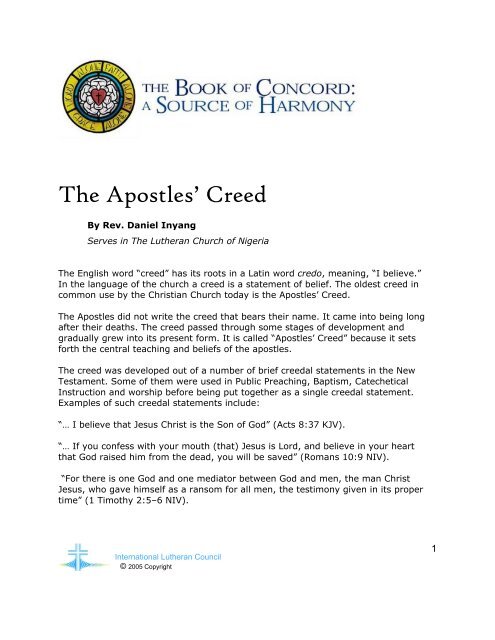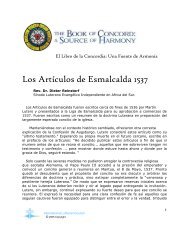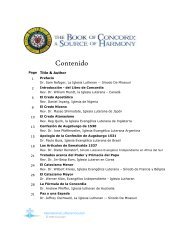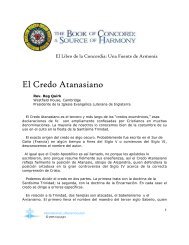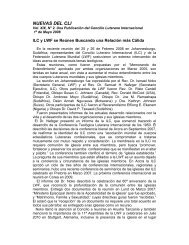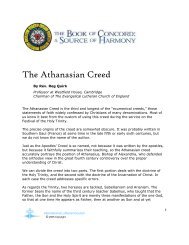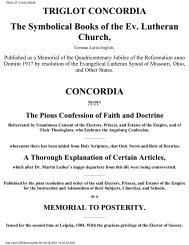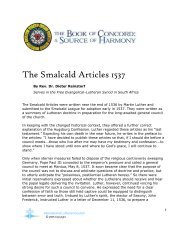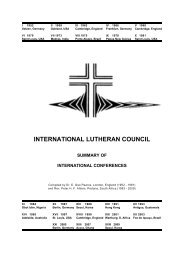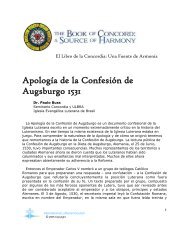The Apostles' Creed - International Lutheran Council
The Apostles' Creed - International Lutheran Council
The Apostles' Creed - International Lutheran Council
Create successful ePaper yourself
Turn your PDF publications into a flip-book with our unique Google optimized e-Paper software.
<strong>The</strong> Apostles’ <strong>Creed</strong><br />
By Rev. Daniel Inyang<br />
Serves in <strong>The</strong> <strong>Lutheran</strong> Church of Nigeria<br />
<strong>The</strong> English word “creed” has its roots in a Latin word credo, meaning, “I believe.”<br />
In the language of the church a creed is a statement of belief. <strong>The</strong> oldest creed in<br />
common use by the Christian Church today is the Apostles’ <strong>Creed</strong>.<br />
<strong>The</strong> Apostles did not write the creed that bears their name. It came into being long<br />
after their deaths. <strong>The</strong> creed passed through some stages of development and<br />
gradually grew into its present form. It is called “Apostles’ <strong>Creed</strong>” because it sets<br />
forth the central teaching and beliefs of the apostles.<br />
<strong>The</strong> creed was developed out of a number of brief creedal statements in the New<br />
Testament. Some of them were used in Public Preaching, Baptism, Catechetical<br />
Instruction and worship before being put together as a single creedal statement.<br />
Examples of such creedal statements include:<br />
“… I believe that Jesus Christ is the Son of God” (Acts 8:37 KJV).<br />
“… If you confess with your mouth (that) Jesus is Lord, and believe in your heart<br />
that God raised him from the dead, you will be saved” (Romans 10:9 NIV).<br />
“For there is one God and one mediator between God and men, the man Christ<br />
Jesus, who gave himself as a ransom for all men, the testimony given in its proper<br />
time” (1 Timothy 2:5–6 NIV).<br />
<strong>International</strong> <strong>Lutheran</strong> <strong>Council</strong><br />
© 2005 Copyright<br />
1
“<strong>The</strong>refore go and make disciples of all Nations, baptizing them in the name of the<br />
Father and of the Son and of the Holy Spirit” (Matthew 28:19 NIV).<br />
Other creedal statements are found in passages like 1 Corinthians 15:3–4;<br />
Philippians 2:10–11; 1 Timothy 3:16; 2 Timothy 2:8; 1 John 5:1; 1 Corinthians<br />
8:6; 1 Timothy 6:13–14; 2 Corinthians 13:14; Ephesians 4:4–5.<br />
According to Dr. Robert Kolb, the text of the Apostles’ <strong>Creed</strong> took its present shape<br />
in the eighth century. It represented a final revision of the old Roman <strong>Creed</strong> which<br />
was first used in the west in the early third century.<br />
Latourette equally asserted that: “<strong>The</strong> present form of what we know as the<br />
Apostles’ <strong>Creed</strong> probably did not exist before the sixth century. However, the<br />
essential core has a much earlier origin. It may go back to an Eastern development<br />
of that formula, but more probably it had its inception in Rome. A briefer form,<br />
known as the Roman <strong>Creed</strong>, was in use in the Church of Rome at least as far back<br />
as the fourth century. ”<br />
<strong>The</strong> present text of the Apostles’ <strong>Creed</strong> can hardly be attributed to a single author.<br />
Equally, no council or group of individuals has been identified with its authorship.<br />
<strong>The</strong> creed was first a baptismal confession and later developed into a statement for<br />
the declaration of faith in Christ—“Jesus is the Son of God.” In further development<br />
it became an apology, a defense of faith in Christ. Later stages saw it become the<br />
refutation of heretical teachings such as Gnosticism, Marcionism, Montanism and<br />
used for Christological teaching.<br />
<strong>The</strong> first article of the creed describes God the Father as Almighty, the maker of all<br />
things, provider and sustainer of all things.<br />
<strong>The</strong> second article describes Jesus Christ as the incarnate Son of God, conceived by<br />
the Holy Spirit; he suffered, died, was buried, he resurrected and ascended into<br />
heaven.<br />
<strong>The</strong> third article describes the Holy Spirit, the state of the Church as holy, the<br />
forgiveness of sin, the resurrection of all believers and the gift of everlasting life<br />
through Christ righteous suffering.<br />
This creed is of great significance to all <strong>Lutheran</strong>s because it confers to us the idea<br />
of one God manifested in three different persons—the Trinity. To <strong>Lutheran</strong>s the<br />
creed is a true Apostolic confession, teaching and belief. It gives us the knowledge<br />
of creation, redemption and sanctification and the gift of eternal life.<br />
<strong>International</strong> <strong>Lutheran</strong> <strong>Council</strong><br />
© 2005 Copyright<br />
2
My Ibibio tribe in Africa already had the cultural idea of one God in three persons.<br />
<strong>The</strong> Ibibio of old believed in Abasi Ukot, Abasi Eyeyen and Abasi Iman—God of the<br />
inlaw, God of the grandchildren and God of the allied, so the creed gained easy<br />
acceptance in the Ibibio area because of the tribe’s former cultural religious<br />
background.<br />
<strong>The</strong> <strong>Lutheran</strong> Church of Nigeria started in 1936 with the rural Ibesikpo clan, the<br />
late Rev. Dr. Jonathan Udoekong its pioneering father. <strong>The</strong> Nigerian church has<br />
grown from an initial 16 congregations to 339 in 38 districts. <strong>The</strong> church is<br />
established in 15 states of Nigeria and works in a dozen different languages, with<br />
English in common. <strong>The</strong> church has more than 80,000 baptized members.<br />
<strong>International</strong> <strong>Lutheran</strong> <strong>Council</strong><br />
© 2005 Copyright<br />
3


